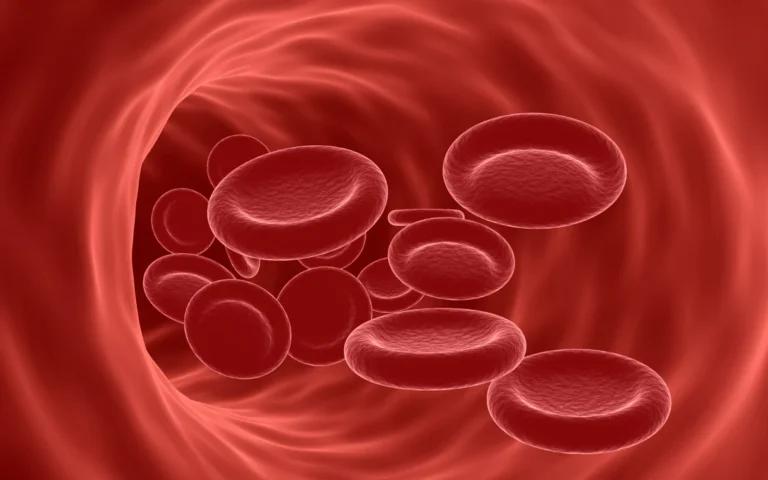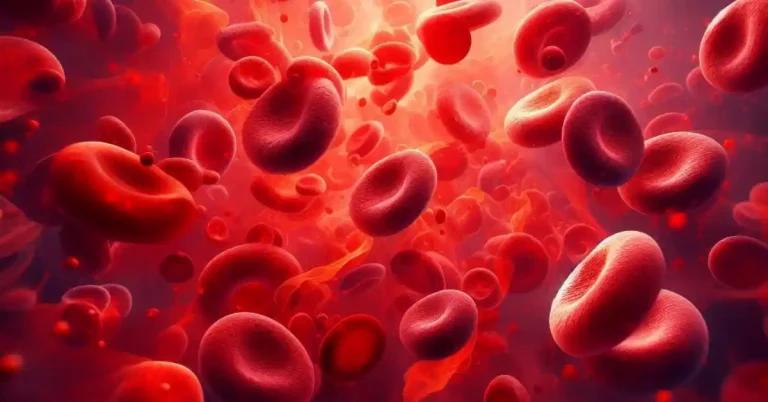Are you feeling tired and run down? Maybe you can’t seem to shake off a general sense of fatigue no matter how much sleep you get. These symptoms could point to anaemia a condition affecting millions of people worldwide. Contrary to what many believe, anaemia isn’t just something that pregnant women experience. Everyone needs healthy red blood cells in order to feel energetic, if yours are on the low side you might be dealing with this common health problem. In this blog post we’ll explore precisely what anaemia is, its causes and symptoms, and potential treatments so that you can make informed decisions about your health moving forward.
Anaemia is a common blood disorder where your body doesn’t have enough healthy red blood cells. Without healthy red blood cells, our organs and tissues wouldn’t get enough oxygen, leading to tiredness, dizziness and other health problems.
What do red blood cells do? Red blood cells are one of the most important components of our circulatory system. They have a key role in travelling around the body, delivering oxygen and nutrients to vital organs and tissues and collecting carbon dioxide to be expelled through our lungs.
Red blood cells have a unique shape that helps them do their job efficiently; they are flexible enough to squeeze through even the smallest capillary beds while also being thick enough to survive multiple trips through complex vascular networks. Each red blood cell contains a special protein called haemoglobin which bonds with oxygen molecules and gives our blood its distinctive crimson hue.
Types of Anaemia
Anaemia can be classified into three broad categories based on the cause: nutritional anaemia, haemolytic anaemia or aplastic anaemia. Nutritional anaemias occur when the body does not get enough vitamins and minerals such as iron, folate and vitamin B12. Haemolytic anaemias happen when there is an abnormality in the red blood cells, making them more prone to being destroyed prematurely by the body’s immune system. Aplastic anaemias occur when something stops the bone marrow from producing new red blood cells.
What are some causes of anaemia?
Poor nutrition
Poor nutrition often includes an inadequate intake of important metals and vitamins needed for red blood cell production. This can ultimately result in anaemia, which occurs when the body does not have enough healthy red blood cells to carry oxygen throughout the body.
Iron deficiency anaemia
The most common form of anaemia is iron deficiency anaemia. Iron is an especially important metal for maintaining a robust red blood cell count. Iron helps haemoglobin, the protein in red blood cells that transports oxygen throughout our bodies, do its job. Without enough iron in your diet, haemoglobin will not be able to create enough healthy red blood cells to deliver oxygen throughout the body efficiently. This inadequacy can lead to fatigue, a pale complexion and appetite loss, as our organs do not receive enough oxygen for them to operate correctly.
Vitamin deficiency anaemia
Nutritional anaemia is a common condition caused by a lack of essential nutrients in the body. Pernicious anaemia is a form of megaloblastic anaemia, also called vitamin B12 deficiency anaemia, it is caused by insufficient vitamin B12 in the body. Iron deficiency anaemia results when your body doesn’t have enough iron to make enough haemoglobin for healthy red blood cells.
It’s also important that we get enough B12, Folate (Vitamin B9) and Vitamin C, which help produce red blood cells properly. As these nutrients can be harder to come by in certain diets or if we’re lacking vital dietary elements like good quality protein, it is key that we supplement our meals with multivitamins or other nutrient-dense foods in order to offset any deficiencies linked with anaemia.
A healthy, balanced diet will usually provide all the necessary nutrients for avoiding nutritional anaemia; however, if you’re concerned, it is important to speak with your doctor, as they can advise if any additional supplementation is required.
Chronic medical conditions
Chronic medical conditions can have a significant impact on one’s health and can even cause anaemia. Some of the most common chronic medical conditions that can lead to anaemia are chronic kidney disease, cancer, ulcerative colitis, Crohn’s disease and rheumatoid arthritis.
For example, chronic kidney disease typically leads to the body not being able to produce enough erythropoietin (a hormone needed for the body to make red blood cells) due to impaired functioning of the kidneys. Similarly, cancer treatments, including chemotherapy and radiotherapy, can deplete nutrients in the body and damage bone marrow, leading to anaemia. Ulcerative colitis results in vitamin B12 deficiency and folate, which disrupts the number of red blood cells produced by the body. Lastly, patients with rheumatoid arthritis may develop an inflammatory disorder which damages red blood cells and eventually leads to anaemia. Crohn’s disease or coeliac disease prevents your body from absorbing nutrients properly.
If you are suffering from any chronic medical conditions, it is important to seek advice from your doctor or healthcare provider if you experience fatigue or other symptoms associated with anaemia.
Inherited disorders
There are many different forms of anaemia, including those that can be inherited from the family. Two common inherited disorders that cause anaemia are thalassemia and sickle cell disease.
Thalassemia
Thalassemia is a group of inherited blood disorders that affect haemoglobin, the protein that normally carries oxygen in red blood cells. People typically develop thalassemia if either parent has a gene variation related to thalassemia. This can cause either too much or too little haemoglobin to be produced, leading to anaemia and other problems related to inadequate oxygen delivery throughout the body.
Sickle cell disease
Sickle cell disease is a serious inherited condition in which the body produces red blood cells in an abnormal shape. These “sickle” shaped cells can get stuck in small vessels throughout the body, causing organ damage and extreme pain. Having sickle cell disease means that you must take extra care of your health because people with this condition are more prone to infections and other complications like strokes.
It’s important to note that both thalassemia and sickle cell disease can vary in severity and require different monitoring/treatment plans depending on the individual diagnosis.
Blood loss
Blood loss due to heavy menstrual bleeding or certain gastrointestinal conditions can contribute significantly to anaemia, as the body is unable to create new red blood cells quickly enough to replenish those lost. Heavy periods are common in many women, but an unusually heavy flow should not be ignored, as this could be a symptom of the onset of anaemia. Gastrointestinal conditions such as ulcers and inflammations in the intestine can also cause considerable blood loss and consequently lead to anaemia.
How Is Anaemia Diagnosed?
Diagnosing anaemia typically begins with a blood test called a complete blood count (CBC). This blood test measures the levels of red blood cells, white blood cells and other elements in the blood. The results of the CBC are compared to expected normal ranges. If there is an abnormality detected, such as a low red blood cell count or haemoglobin levels, then further tests will be ordered to determine the cause of reduced blood cell production or excessive blood cell loss. This could include blood tests to check for mineral deficiencies e.g. iron levels and infections, as well as imaging tests to identify any underlying health conditions. After diagnostic tests are completed and an underlying cause has been identified, a doctor can provide information about treatments that might improve your overall health and address the anaemia.
What are some of the symptoms of anaemia?
You may have no symptoms if the anaemia is mild or if the problem develops slowly. Symptoms that may occur first include:
- Feeling fatigued
- Headaches
- Lack of focus or concentration
- Irritability
- Loss of appetite
- Numbness and tingling of hands and feet
If the anaemia gets worse, symptoms may include:
- Irregular heartbeat
- Brittle nails
- Desire to eat ice or other non-food things (pica syndrome)
- Lightheadedness
- Pale skin
- Shortness of breath with mild activity or even at rest
- Sore or inflamed tongue
- Mouth ulcers
- Abnormal or heavy menstruation in females
- Loss of sexual desire in men
What are some of the treatments for anaemia?
The treatment for anaemia depends on its underlying cause. Suppose you are diagnosed with iron deficiency anaemia. In that case, your doctor may recommend increasing your dietary intake of iron-rich foods like lean meats, dark green leafy vegetables, fortified cereals, dried fruits, nuts and seeds. Your doctor may also prescribe iron supplements if necessary.
For folate deficiency anaemia, your doctor may recommend taking folic acid supplements or receiving regular injections if needed. Folate can be found in fruits and fruit juices, dark green leafy vegetables, green peas, kidney beans, peanuts and enriched grain products, such as bread, cereal, pasta and rice.
For vitamin B12 deficiency anaemia supplementing or incorporating meat, dairy products, fortified cereal, and soy products into your diet is recommended.
Your doctor may also suggest increasing Vitamin C in your diet. Vitamin C is essential for the body to absorb iron from the food we eat. When iron enters our blood, it binds to the protein transferrin in order for it to be transported around our bodies. Vitamin C helps break this bond between transferrin and iron, allowing us to make use of iron’s nutritional benefits. As a result, absorbing dietary iron is much more efficient when accompanied by foods rich in vitamin C, such as citrus fruits, kiwi or strawberries.
Blood transfusion is typically necessary in order to correct anaemia caused by heavy blood loss. For serious cases (such as those caused by cancer), a transfusion of red blood cells may be necessary in order to restore normal levels in the body.
What are the long-term complications of anaemia?
Anaemia is a serious condition that should not be overlooked, as it can have serious consequences if left untreated. Ongoing anaemia can also weaken the immune system leaving you vulnerable to other illnesses and infections. Unfortunately, the longer anaemia is left untreated, the more severe complications such as heart failure, stroke, poor physical growth and development in children, and pregnancy complications can occur. This can range from mild to life-threatening. It’s important to recognise any signs or symptoms related to anaemia early on and seek treatment quickly in order to prevent further health issues from developing.
Anaemia is a common medical condition that affects people all over the world, from young children to elderly adults alike. It can have serious implications, so it’s important that those suffering from its symptoms seek medical attention right away in order to get properly diagnosed and treated accordingly. Luckily there are treatments available for those who suffer from anaemia ranging from making dietary changes to taking supplements to more serious treatments depending on the cause of the patient’s anaemic condition. Speak with your doctor if you think you might have anaemia so they can help guide you through this process!
Sources
Medical Disclaimer
NowPatient has taken all reasonable steps to ensure that all material is factually accurate, complete, and current. However, the knowledge and experience of a qualified healthcare professional should always be sought after instead of using the information on this page. Before taking any drug, you should always speak to your doctor or another qualified healthcare provider.
The information provided here about medications is subject to change and is not meant to include all uses, precautions, warnings, directions, drug interactions, allergic reactions, or negative effects. The absence of warnings or other information for a particular medication does not imply that the medication or medication combination is appropriate for all patients or for all possible purposes.










